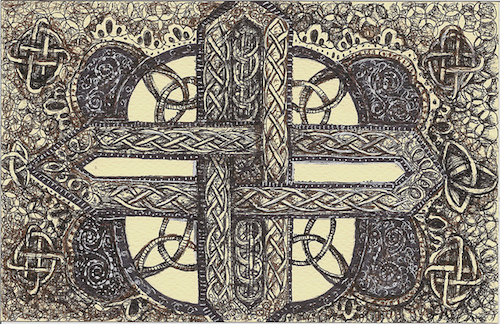We run our website the way we wished the whole internet worked: we provide high quality original content with no ads. We are funded solely by your direct support. Please consider supporting this project.

The Cross and The Trinity
Out of love for humankind, Scripture tells us, Jesus emptied himself of his divine prerogatives, set aside the glory he had with the Father from before the foundation of the world, became a human being and bore our sin as he died a God-forsaken death on Calvary (Phil 2:5-7). Though Jesus remained fully God, he entered into total solidarity with humanity by becoming a full human being. And though Jesus remained sinless, he entered into total solidarity with our sin and condemnation, to the point that Paul boldly proclaimed that Christ in some sense became our sin and became our curse (2 Cor 5:21). The cross is the culminating expression of the meaning of the Incarnation and everything else Jesus was about.
The cross reveals a God of unfathomable humility and mercy who is not above stooping to appear far less beautiful than he actually is—to appear as a guilty, crucified criminal!—in order to save us and to continue to achieve his sovereign purposes. The essence or character of God is the incomprehensibly humble, self-sacrificial love displayed on the cross.
While this revelation of course never ceases to be wonderfully mysterious, I believe it can be rendered intelligible, but only when we accept that God’s eternal nature is a union of three divine Persons who eternally give themselves wholly to one another in perfect, humble, self-giving love.
As Father, Son and Holy Spirit, God is from all eternity a self-giving God who pours himself out for “another.” Indeed, this is not only something the three Persons of the Trinity do; this is who the triune God eternally is. As TF Torrance writes,
The atoning act perfected in the cross of Jesus Christ is grounded in the very being of the eternal God, that is, in the eternal being of the Holy Trinity (The Mediation of Christ, 113).
This, I contend, is the meaning of the revelation that God is love—the kind of love that is revealed when God stoops to the infinite extreme of becoming a human and dying on a cross for a race of people who could not deserve it less (I Jn 4:8; 3:16).
The revelation of the Trinity renders the revelation of God on the cross intelligible because it means that when God humbly poured himself out on behalf of humanity by stooping to the furthest extreme possible, he was not doing something foreign to himself. To the contrary, by stooping in this way, the eternal triune God was simply enveloping humans into the self-giving, triune love that he eternally is.
As paradoxical as it sounds, when God the Son stooped to the infinite extremity of taking on our God-forsakenness on the cross, he was manifesting outwardly, in time, the perfect unity he eternally enjoys with the Father and the Spirit. Because God’s true eternal nature is a perfect, other-oriented, self-giving fellowship of three divine persons, we can begin to understand the paradoxical claim that God is revealed by becoming something that is not only different from himself (a human being), but that is even utterly antithetical to himself (our sin and God-forsakenness). The infinite intensity of the perfect love that is the eternal character of the triune God is most clearly revealed in the fact that God condescended to the furthest extreme possible out of love for a race of rebels who wanted only to crucify him.
Photo credit: molossus, who says Life Imitates Doodles via Visual Hunt / CC BY-NC-ND
Category: General
Tags: Cross, Cruciform Theology, Trinity
Topics: Attributes and Character
Related Reading

Did God Give Violent Laws? A Response to Paul Copan (#13)
In his critique of Crucifixion of the Warrior God (CWG) at the Evangelical Theological Society annual meeting in November, Paul Copan takes issue with my contention that the violent dimension of OT laws reflects God accommodating the fallen and culturally conditioned perspectives of his people at this time. In my view, God was stooping to…

Podcast: If Jesus Fully Reveals God, Do We Need the Old Testament?
Greg looks at the value and the role of the Old Testament in light of Jesus’ full revelation of God on the cross. http://traffic.libsyn.com/askgregboyd/Episode_0181.mp3

Who Rules Governments? God or Satan? Part 1
Running throughout Scripture is the motif that depicts God as the ultimate ruler of the nations. On the other hand, the NT teaches that the ruler of nations is Satan. What do we do with these two apparently conflicting motifs? First, because OT authors tended to understand the creation along the lines of a king-centered…

Podcast: How Do We Understand the Flood Through the Lens of the Cross?
Greg dives deep into the flood, to make sense of it through the lens of Christ on the cross. http://traffic.libsyn.com/askgregboyd/Episode_0087.mp3

An Alternative to Biblical Inerrancy
As with all other theological issues, when it comes to affirming that Scripture is “God-breathed,” everything hangs on where one starts. A dominant strand of the Evangelical tradition started with the assumption that, if God is perfect, and if Scripture is “God-breathed,” then Scripture must also be perfect or “inerrant.” Other “progressive” evangelicals have responded by…

When the Law Demanded the Death Penalty
The Sinai covenant is significantly structured around violence. It motivates behavioral conformity by promising rewards and threatening violence. Without the threat of violence, the law looses its “teeth.” If the law is an acquiescence to sin, then the divinely sanctioned violence that is associated with it must also be considered an acquiescence to sin. The…
